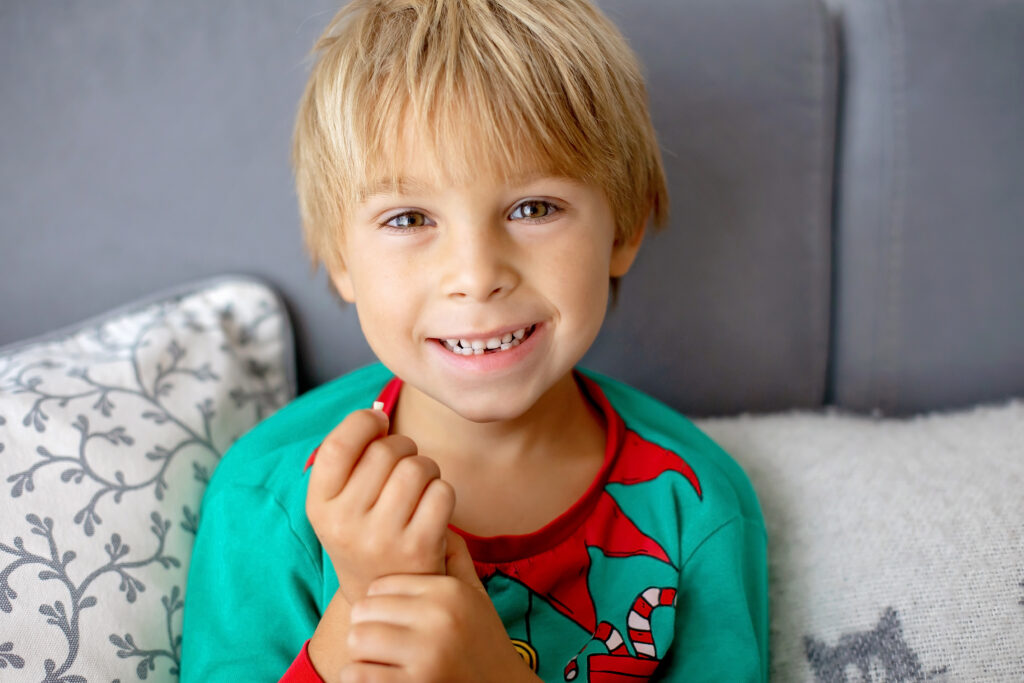At What Age Do Baby Teeth Start to Fall? Everything You Need to Know

Table of Contents

Image Source: Adobe Stock
As parents, watching our children grow up is an exciting journey filled with many milestones. One of these milestones is the loss of baby teeth, which marks the transition to a new phase of dental development. But when exactly do baby teeth start to fall out, and what can we expect during this process? In this article, we will explore the age range for losing baby teeth, the order in which they fall out, and how to ensure your child's oral health during this exciting time.
Understanding the Timeline: When Do Kids Start Losing Teeth?
The age at which children start losing their baby teeth can vary, but most commonly, it begins around 6 to 7 years old. However, it's important to note that every child is unique, and some may start losing teeth as early as 4 years old, while others may not experience tooth loss until they're 8 or 9. As parents, it's essential to be patient and let nature take its course.
The Order of Tooth Loss: Which Baby Teeth Fall Out First?
Typically, baby teeth fall out in the same order they came in. The first teeth to loosen and fall out are usually the two bottom middle teeth, also known as the lower central incisors. These are followed by the two top front teeth, known as the upper central incisors. This sequence is quite common, but don't be alarmed if your child's teeth don't follow this exact pattern. Every child is different, and teeth can fall out in a slightly different order.
The Timeline for Losing Baby Teeth: A Step-by-Step Guide
While the exact timing may vary, here's a general timeline of when you can expect your child to lose their baby teeth:
- Around 6 to 7 years old: This is when most children lose their first baby tooth. It's often one of the lower central incisors, which are used for cutting and crunching food. This tooth may have erupted when your child was around 6 to 10 months old. Around the same time, your child's permanent first molars may also start to emerge.
- Around 7 to 8 years old: The next set of baby teeth to fall out are usually the upper and lower lateral incisors. These are the teeth next to the front teeth. Your child may lose these teeth when they're around 7 or 8 years old. Additionally, their permanent upper central incisors or permanent lower lateral incisors may also start to come in. During this stage, it's normal for the new permanent teeth to look slightly larger than the baby teeth they're replacing.
- Around 9 to 12 years old: As your child enters late childhood, they will start losing their baby molars. The first molars, both upper and lower, will likely begin to shed between the ages of 9 and 11. The second molars will fall out slightly later, typically between the ages of 10 and 12. Alongside the molars, your child will also lose their four pointy canine teeth, known as cuspids. The lower canines usually go first, followed by the upper canines. In their place, a new set of permanent teeth will begin to emerge, including the upper canines, upper and lower first premolars, and upper and lower second premolars.
- Around 12 to 13 years old: It's not uncommon for some children to still be losing teeth at this age. Additionally, the upper and lower second molars will also start to appear during this time.
By the age of 13, most children will have lost all of their baby teeth, and their permanent teeth will have taken their place. However, it's important to remember that these are general guidelines, and the timing may vary from child to child.
Helping Your Child Navigate the Process: Tips for Losing Teeth
Losing baby teeth can be an exciting but sometimes uncomfortable experience for children. As parents, there are several ways you can support your child through this process:
- Provide reassurance: Let your child know that losing teeth is a natural part of growing up and that it's something everyone goes through. Reassure them that it's normal to feel a little discomfort, but it means their permanent teeth are on their way.
- Encourage gentle wiggling: If your child's tooth is loose, encourage them to gently wiggle it with their tongue or clean fingers. This can help loosen the tooth further and make it easier for it to fall out naturally. However, avoid pulling on the tooth forcefully, as this may cause pain or bleeding.
- Maintain good oral hygiene: Remind your child of the importance of brushing their teeth twice a day and flossing regularly. This will help keep their gums and remaining baby teeth healthy while also preparing them for the arrival of their permanent teeth.
- Introduce the tooth fairy: Embrace the tradition of the tooth fairy to make losing teeth a fun and magical experience for your child. Let them know that the tooth fairy will visit when they lose a tooth and leave a special surprise in exchange.
- Monitor for any concerns: While most cases of tooth loss are natural and without complications, it's essential to keep an eye out for any signs of issues. If your child experiences excessive pain, prolonged bleeding, or if their permanent teeth are not coming in as expected, consult your dentist for further evaluation.
Remember, every child's dental development is unique, and the process of losing baby teeth can vary. Be patient, provide support, and celebrate this milestone with your child!
Ensuring a Lifetime of Healthy Teeth: Maintaining Good Oral Habits
Losing baby teeth is just one part of your child's dental journey. It's crucial to instill good oral hygiene habits from a young age to promote a lifetime of healthy teeth. Here are some tips to help you along the way:
- Regular brushing and flossing: Encourage your child to brush their teeth twice a day using a soft-bristled toothbrush and fluoride toothpaste. Teach them proper brushing techniques and ensure they also floss daily to remove plaque and food particles from between their teeth.
- Healthy diet: Provide a balanced diet rich in fruits, vegetables, whole grains, and lean proteins. Limit sugary snacks and beverages, as they can contribute to tooth decay. Encourage your child to drink water instead of sugary drinks.
- Regular dental check-ups: Schedule regular dental visits for your child, starting from their first tooth eruption. Regular check-ups allow the dentist to monitor their dental development, detect any potential issues early on, and provide preventive treatments like fluoride treatments and dental sealants.
- Lead by example: Be a role model for your child by practicing good oral hygiene yourself. Brush and floss your teeth together, making it a fun and interactive activity. Children learn best by observing and imitating their parents' behavior.
- Educate about the importance of oral health: Teach your child about the importance of taking care of their teeth and gums. Explain how good oral hygiene can prevent cavities, gum disease, and other dental problems. Use age-appropriate resources and engage in conversations about oral health.
By incorporating these habits into your child's daily routine and providing them with the necessary support and guidance, you can help set them on the path to a lifetime of healthy teeth and a beautiful smile.
Conclusion
Losing baby teeth is an exciting and natural part of a child's development. While the exact age at which baby teeth start to fall out can vary, most children begin losing teeth around 6 to 7 years old. The process typically follows a sequence, with the two bottom middle teeth being the first to go, followed by the upper front teeth. As parents, it's important to provide reassurance, encourage good oral hygiene habits, and monitor your child's dental development. By doing so, you can ensure that your child's transition from baby teeth to permanent teeth is smooth and healthy. Remember, each child's journey is unique, so embrace their individual timeline and celebrate this milestone together!
Important Links
https://www.thesuperdentists.com/when-do-kids-start-losing-teeth/
https://www.healthpartners.com/blog/when-do-kids-lose-their-first-tooth/
https://greenvillefamilydentistrysc.com/at-what-age-do-baby-teeth-normally-fall-out/
https://www.colgate.com/en-us/oral-health/kids-oral-care/when-do-baby-teeth-fall-out
https://www.whattoexpect.com/toddler/grooming/when-baby-teeth-fall-out.aspx
The information available on the Website is for general health information only and is not intended to be a substitute for professional medical advice, diagnosis or treatment. You should not rely exclusively on information provided on the Website for your health needs. All specific medical questions should be presented to your own health care provider and you should seek medical advice regarding and before making any changes related to your health.
If you choose to use the information available on the Website without prior consultation with and consent of your physician, you are agreeing to accept full responsibility for your decisions and agreeing to hold harmless Randall K. McVey, DMD PA, its agents, employees, contractors, and any affiliated companies from any liability with respect to injury or illness to you or your property arising out of or connected with your use of this information.
MedicAL DISCLAIMER
Patient Portal
help
Disclaimers
HIPAA
Accessibility
Privacy Policy & Cookie Policy
Terms & Conditions